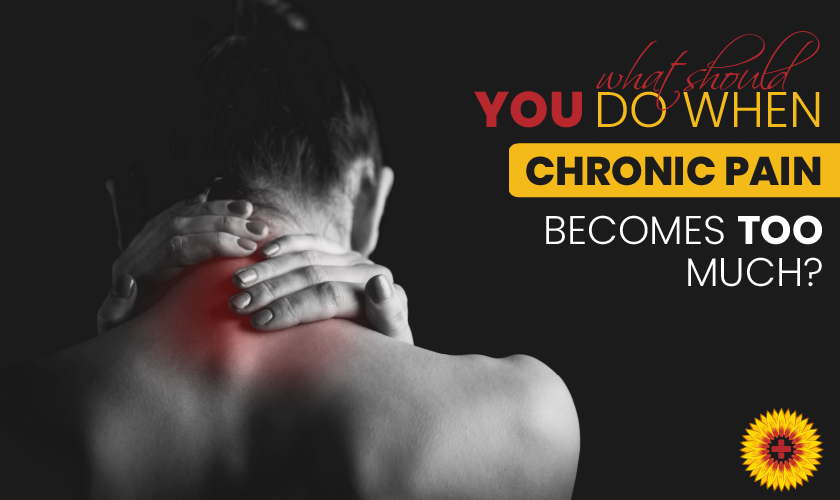What should you do when chronic pain becomes too much? There are a few things that you can do to get relief from the pain.
Chronic pain lasts months or years and occurs in all parts of the body. It inhibits daily life and can lead to sadness and worry.
The first step in treatment is to check out and treat the cause.
When circumstances do not permit it, the most effective approach involves a blend of medications, therapies, and lifestyle adjustments.
To get treatment for chronic pain, you may visit Urgent Care of Kansas.
What is Chronic Pain?
Chronic pain is pain that continues for over three months. The pain can be there all the time, or it may shuffle for a while. It can happen to any part of your body.
Chronic pain can interfere with daily events such as working, having a social life, and taking care of yourself or others.
It can lead to depression, anxiety, and trouble sleeping — this response creates a cycle that’s tough to break.
Contact us to gain more information and details.
What Should You Do When Chronic Pain Becomes Too Much? – Things to Consider
- Change Your Thinking: The way you think about your pain can impact your emotional wellness. Learning to modify negative thoughts and feelings about pain can make a huge difference. Cognitive-behavioral therapy and mindfulness-based stress reduction are two methods that have been shown to be effective in managing chronic pain by changing how people respond to it.
- Pacing Yourself: Overdoing activities on your good days can cause more painful days. Learn to listen to your body and pace yourself to avoid exacerbating your pain. This involves balancing work, leisure, and rest which can help you maintain a more consistent level of activity without overstraining yourself.
- Mindfulness and Meditation: Adding mindfulness and meditation into your everyday routine can help reduce stress and improve pain management. These practices encourage a mental state of awareness, focus, and acceptance which can be particularly beneficial when dealing with chronic pain.
- Get Professional Help: When pain becomes too much to handle alone, it’s important to get the help of healthcare professionals. This could mean consulting with your primary care physician for a new treatment plan, seeking out a pain specialist, or considering mental health support for coping with the emotional aspects of chronic pain.
Lifestyle Changes Help with Chronic Pain
Four major lifestyle aspects can affect your chronic pain and aid in minimizing it. Healthcare providers sometimes named them the four pillars of chronic pain.
They include:
- Stress: Stress can play a main role in chronic pain, so it’s vital to try to reduce it as much as possible.
- Exercise: Participating in low-intensity workouts, such as walking or swimming, for 30 minutes every day may help decrease your pain.Exercise can also be a stress back-up for some persons, which is significant to manage when you have chronic pain.
- Diet: Eating healthy food is crucial for improving overall health. Your healthcare provider may advise trying an anti-inflammatory diet that eliminates foods that cause swelling, such as red meat and carbohydrates.
- Sleep: Availing of enough sleep is vital for your mental health. Poor sleep can cause you to gain weight, which could worsen your chronic pain. Quality sleep is also significant for stress management.
According to the American Psychological Association, chronic pain affects the person both physically and mentally.
Neurostimulation Therapy for Chronic Pain
Neurostimulation therapy for chronic pain is a well-established treatment, which has been used by doctors for over 50 years.
Neurostimulation therapy is a treatment that targets the nervous system and efforts to block pain signals using low-voltage electrical desires.
Neurostimulation therapy involves the assignment of a fully implantable, alterable system that allows patients to control their level of inspiration with a handheld device.
Providing neurostimulation treatment involves a modest outpatient technique, first done in trial form.
In this technique, a patient attempts the neurostimulator device for three to seven days to see if they are pleased with the results.
If they get successful pain release through the neurostimulation trial, then the neurostimulator is fixed forever.
Final Word
What should you do when chronic pain becomes too much? Chronic pain is rarely cured completely, but you can achieve it by combining effective approaches.
Current chronic pain treatments can reduce a person’s pain score by approximately 30%.
Researchers continue to investigate pain disorders. As neuroscience advances and our understanding of the human body improves, more effective treatments should be possible.
If you are facing chronic pain or anxiety, you should seek mental health treatment.
Visit us at Urgent Care of Kansas to seek professional assistance.
FAQs
What to do when chronic pain is unbearable?
When chronic pain becomes unbearable, get immediate help from healthcare professionals.
Why is my chronic pain getting worse?
Your chronic pain could be worsening due to a number of reasons such as increased inflammation, stress, overexertion, or progression of an underlying condition.
How do you fight chronic pain?
- Coping methods
- Deep breathing practices
- Keep moving
- Mindfulness techniques
- Get professional help and support
Is chronic pain mostly mental?
Even though chronic pain can have psychological effects, it is not solely a mental issue.



No comment